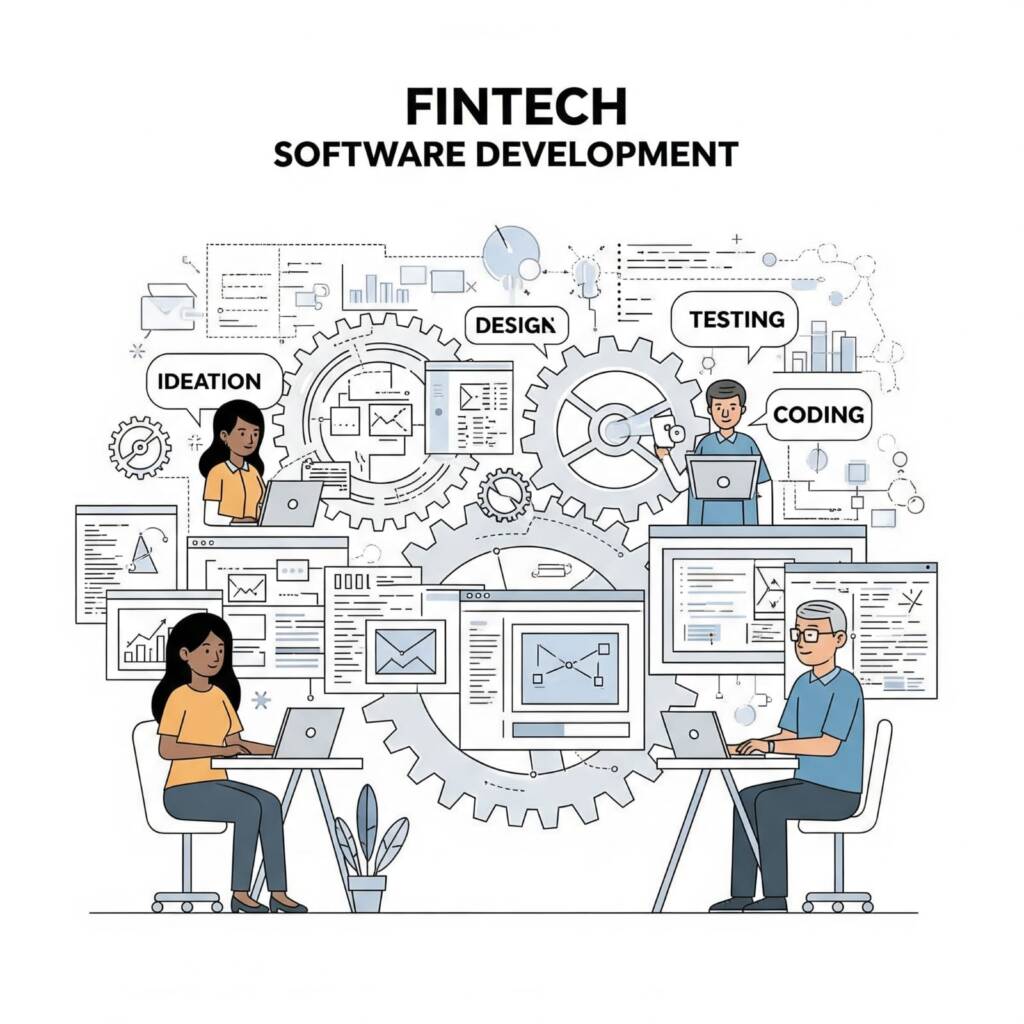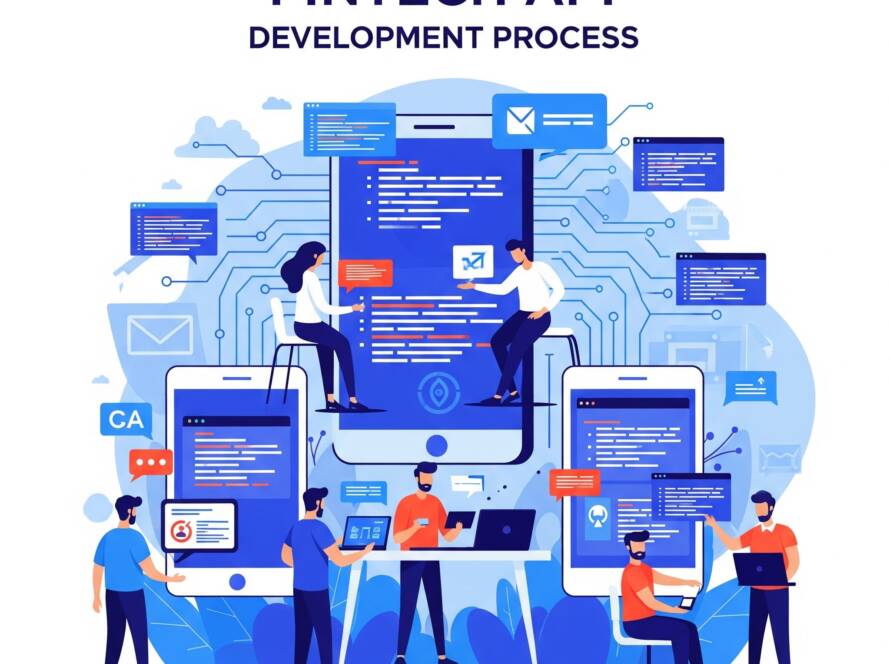Imagine transferring money, applying for a loan, and investing in stocks—doing all these
before breakfast. That’s not some fictional world, but a real one, thanks to fintech software
development services.
From empowering mobile banking apps to deploying robo-advisors and enabling secure
digital payment systems, financial technology solutions are revolutionising how the
world moves money. But how can your business keep up, remain firm, or better yet, lead?
Let’s uncover how fintech innovation is reshaping the rules of finance.

INTRODUCTION
Fintech software development services refer to the end-to-end process of designing,
building, deploying, and maintaining technology solutions for the financial services
industry. These services aim to modernize how individuals and businesses manage
money—whether it’s banking, investing, lending, insurance, or payments—by using
software and digital technologies.
🔧 COMPONENTS OF FINTECH SOFTWARE DEVELOPMENT
SERVICES
A wide range of tools and technologies are covered by complete fintech software
development services:
- Custom Fintech Applications: Custom fintech software development services produce
customized and adaptable solutions for the delivery of automated financial services. - Mobile Banking App: Since more people use their mobile devices than their desktops,
mobile banking apps have become necessary for delivering 24/7 service, which serves as
the foundation of your business, fosters expansion, and facilitates exceptional customer
care. Systems that handle all aspects of banking operations, such as risk management,
customer onboarding, transaction processing, loan management, account management,
regulatory compliance, reporting, and analytics. - Digital Payment Systems: Online programs that facilitate quick and simple payments and
money transfers while maintaining complete security of the user’s personal and payment
details. Cryptocurrency wallets for managing and transacting cryptocurrency assets. - Robo-Advisors
By providing automated, inexpensive financial planning, AI-powered robo-advisors are
revolutionizing investment methods. - Blockchain Integration
Blockchain integration enables secure and transparent transactions, facilitating
cryptocurrency wallets, smart contracts, and decentralized finance (DeFi) applications.
- AI in Financial Technology
The application of AI in fintech allows for chatbot-based customer service, individualized
financial insights, and smart fraud identification. - Integration of APIs
By providing smooth API integration, systems can communicate with KYC databases,
payment processors, banks, and CRMs, resulting in a consistent experience. - Compliance Solutions for Fintech
Integrated fintech compliance systems that automate monitoring and reporting make it
simpler to navigate legislation such PSD2, GDPR, or PCIDSS. - Fintech Infrastructure in the Cloud
Cloud-based fintech infrastructure is scalable, affordable, and resilient, ensuring that
systems can handle rapid user growth and unexpected traffic surges.
FINTECH MARKET
The fintech market is expanding, with an anticipated CAGR of 16. 5% and a value of over
$1,150 billion by 2032. Every new company has a chance to tap into a developing niche and
gain leadership in the market since the ever-changing financial technology environment is
always presenting new possibilities. The cost of launching a profitable fintech product is
astounding; despite the continued macroeconomic uncertainty, fintech executives are still
generating three-digit annual revenue growth and drawing billion-dollar investments. For
BFSI incumbents, modern fintech solutions can provide 30–50% operational cost reductions,
as well as the possibility of doubling profits via new, digitally enabled service models.
KEY INDUSTRIES BENEFITTING FROM FINTECH SOFTWARE
DEVELOPMENT SERVICES
Fintech is not just for banks anymore. A variety of industries are embracing financial
technology solutions to revolutionize how they operate:
● Insurance: Automating claims, underwriting, and risk assessment.
● Retail: Embedded finance through buy-now-pay-later (BNPL) and loyalty wallets.
● Lending: Launching peer-to-peer lending platforms that simplify loan processing.
● Wealth Management: Deploying robo-advisors and AI-based investment tools.
● Healthcare: Integrating secure financial software for patient billing and health savings
accounts.
Choosing the Right Fintech Software Partner
Your technology partner should not only understand code but also understand finance. When
choosing a vendor for fintech app development, ensure they offer:
● End-to-end fintech software development services
● Deep knowledge of fintech compliance solutions
● Experience in blockchain integration and AI in fintech
● Strong portfolio in building cross-platform fintech apps
● Scalability through cloud-based fintech infrastructure
📈 Future Trends in Fintech
Here’s what’s shaping the future of financial technology solutions:
● Embedded Finance: Non-financial companies offering financial services natively.
● Voice-Activated Banking: Integrating voice assistants with mobile banking apps.
● Hyper-Personalization: Using AI in fintech to customize offerings in real time.
● Decentralized Finance (DeFi): Bypassing traditional intermediaries via blockchain
integration.
● Green Finance: Tools for tracking ESG metrics in financial analytics software.
COST
Cost of Fintech Software Development Services in 2025
Investing in fintech software development services is essential for creating secure, scalable,
and compliant financial platforms. Costs vary widely based on the type of application, feature
complexity, tech stack, and development location.
● Basic apps (like mobile banking) may cost $40,000–$100,000, while advanced
solutions (e.g., blockchain platforms or crypto exchanges) can range up to $500,000+.
● Influencing factors include feature scope, security needs, third-party integrations, and
user-centric fintech design.
● Development costs also depend on geography, with rates ranging from $25/hour in
Asia to $200/hour in the US/UK.
● Typical annual maintenance costs run 15%–20% of the initial budget.
● Common engagement models include fixed price, time & materials, and dedicated
teams.
A sample $150,000 app budget includes:
● Development & integrations (~$95,000)
● Design & planning (~$25,000)
● Compliance, testing, cloud, and post-launch support (~$30,000)
A well-built fintech product delivers strong ROI through new revenue, user retention, and
regulatory confidence.
FINAL THOUGHTS
In an increasingly competitive and regulated financial landscape, the right fintech software
development services can mean the difference between leading the market or falling behind.
● 📈 According to Statista, the global fintech market is projected to reach $305 billion
by 2025, growing at a CAGR of over 22%.
● 💡 A Deloitte survey revealed that 73% of financial service leaders are already using
AI to gain a competitive advantage.
● 🔐 With cyberattacks on financial systems rising by 238% in just two years (IBM,
2024), securing your fintech solution is no longer optional—it’s mission-critical.
From secure financial software to AI-driven robo-advisors, every digital interaction you offer
must be fast, frictionless, and future-proof.
Partnering with experienced fintech developers ensures your product is not only technically
sound but also compliant, scalable, and built for tomorrow’s challenges.
“The future of finance is not just digital—it’s intelligent, secure, and radically
customer-centric.” — McKinsey & Company, Global Fintech Report
Don’t just participate in the fintech revolution—shape it.

